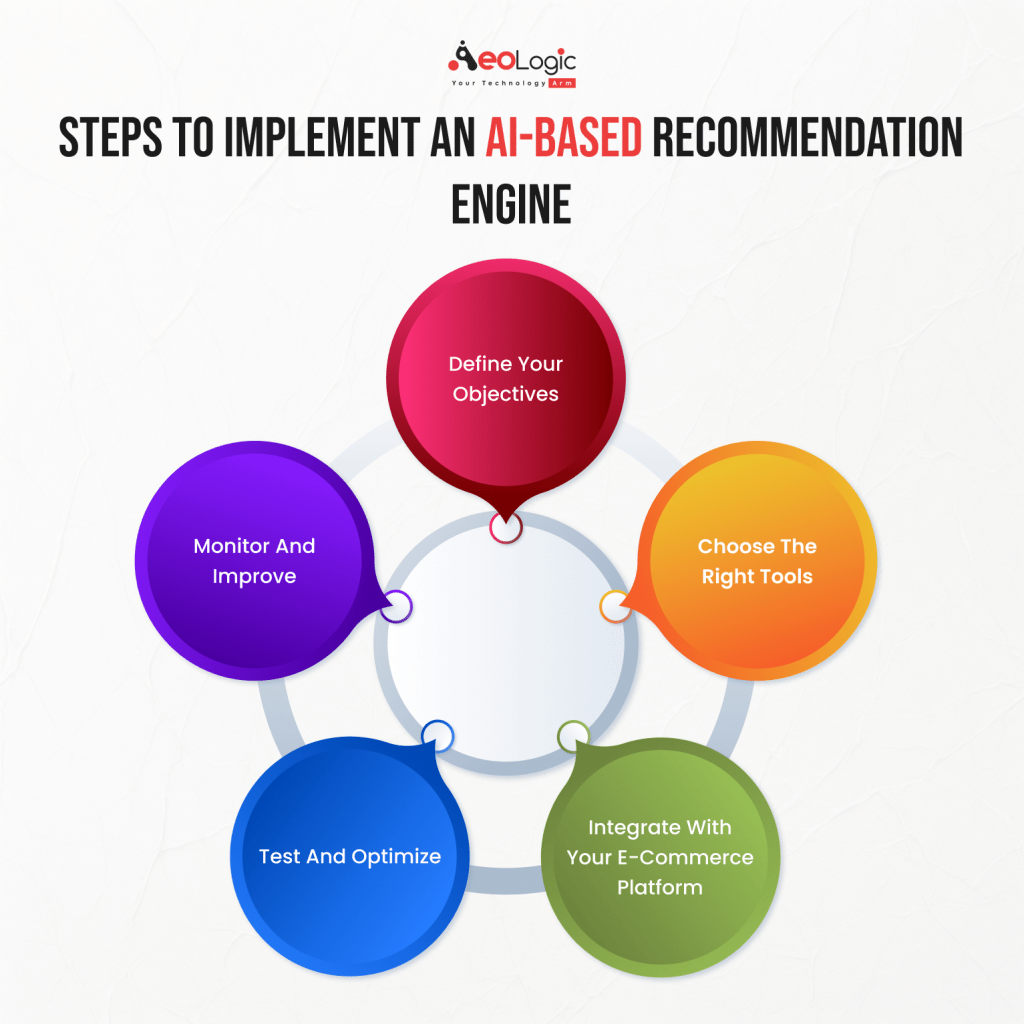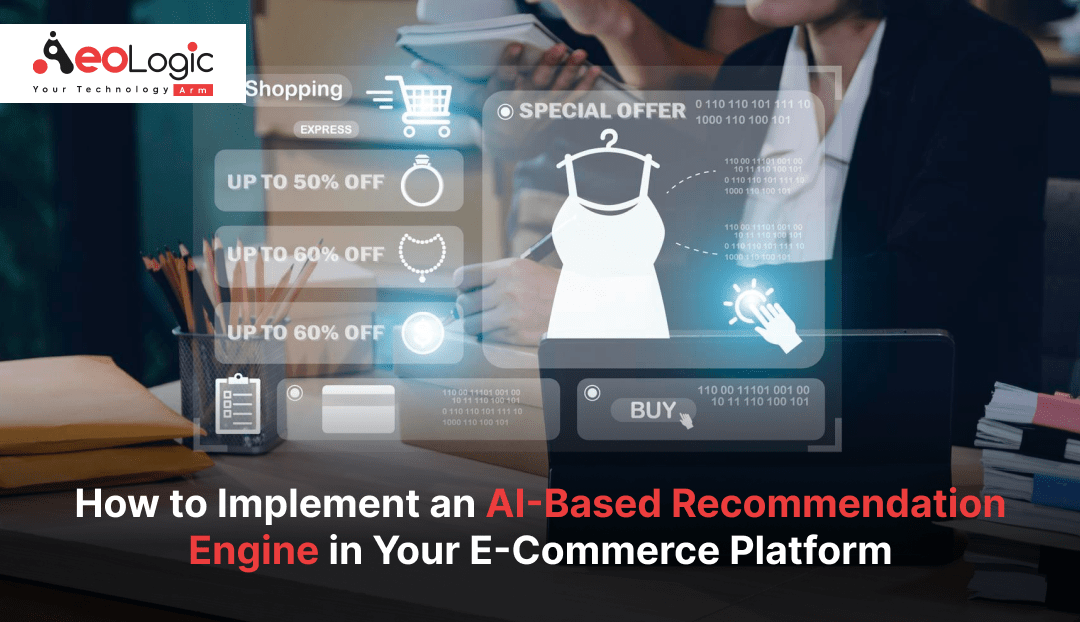In the ever-evolving world of e-commerce as well as ‘ staying ahead of the reign means perpetually improving your user experience. One right way to do this is by implementing an AI-Based Recommendation Engine. In advanced years as well as ‘ the use of technology in e-commerce has exploded. In fact, an account by McKinney suggests that 35% of what consumers purchased on Amazon was challenged by crossway recommendations.
But why is this technology so important to your platform’s success? AI doesn’t just automate tasks; it can understand your customers better than ever before. And in a world where personalization is key, this makes a huge difference.
Why Use an AI-Based Recommendation Engine?
Personalized User Experience
When you implement an AI-based recommendation Engine, you make a personalized have for each visitor. Artificial technology observes user behavior, learn from it, and suggest products they are clever to love.
You may have noticed how platforms like Netflix or Amazon seem to know incisively what you want. This is because they have improved their referral engines. Why does personalization matter? Because we all craved something made just for us. People tend to Entrust brands that nominate an inward touch. Trusted, as we know, leads to sales.
Also Read: How AI and Automation are Elevating Hotel Management and Operations
Improved Conversion Rates
When the right products are placed in front of users, conversion rates naturally increase. An AI-based recommendation Engine can suggest complementary products, encourage upselling, and even remind users of abandoned carts. These seemingly small nudges often make a significant impact on the bottom line.
For example, businesses that use AI-based recommendations can see an increase in conversions by up to 20%.
Customer Retention
Keeping customers engaged and loyal is a challenge. However, with AI solutions by Aeologic can design products that keep users coming back for more. Imagine walking into a store where the saleswoman remembers everything you’ve ever bought and knows exactly what you might want next. That’s an experience you can create with AI.
How an AI-Based Recommendation Engine Works
Data Collection
First, it’s essential to understand that AI doesn’t work on magic; it works on data. AI-based recommendation engines gather data from users’ past behavior: what they’ve clicked on, what they’ve bought, how long they’ve spent browsing, and even what they’ve ignored.
Machine Learning Models
Once the data is collected, machine learning algorithms get to work. They analyze patterns, preferences, and trends. It’s like having a personal shopper for every user. But instead of making guesses, it’s basing recommendations on solid data and past behaviors.
Real-Time Recommendations
One of the powerful features of AI is its ability to offer real-time recommendations. As a user interacts with your platform, the AI adapts. It can suggest products that are relevant at that exact moment. This level of responsiveness increases the chances of a sale happening in real time.
Feedback Loops
AI doesn’t just stop after one recommendation. It learns from its own successes and failures. For instance, if a user clicks on a recommendation and buys the product, the AI notes this as a success. If the user ignores the recommendation, the AI adjusts its future suggestions.
Steps to Implement an AI-Based Recommendation Engine

Step 1: Define Your Objectives
Before you dive into the world of AI, it’s crucial to define your goals. Are you looking to boost sales, improve user engagement, or perhaps retain more customers? Your goals will determine how you set up your AI-Based Recommendation Engine.
Step 2: Choose the Right Tools
There are plenty of AI tools out there, each with different strengths. Some are plug-and-play, while others require a more customized approach. Some platforms to consider include Google’s TensorFlow, Amazon Personalize, or Microsoft Azure’s AI tools.
Step 3: Integrate with Your E-Commerce Platform
The next step is to integrated the referral tool with your modern day platform. This can be challenging depending on the complexness of your site. However, most modern-day tools nominate comparatively simple consolidation solutions. It is authorized to check that the referrer fits seamlessly into your existing infrastructure.
Step 4: Test and Optimize
Once your AI-Based Recommendation Engine is live, don’t stop there. Testing is key. Run A/B tests, try different algorithms, and see what works best for your customers. The more you test, the better your recommendations will be.
Step 5: Monitor and Improve
AI was not a set it and forget it tool. Like any good technology as well as it requires continuous monitoring. Pay tending to how users are interacting with your recommendations. Are they clicking on suggested items? Are they making more purchases? Use this data to continually perplex and improved your passport engine.
Also Read: Top AI Retail Solutions For Transforming Customer Engagement And Support
Benefits of AI-Based Recommendation Engines
Increased Sales
One of the most prompt and mensurable benefits of an ai based recommendation engine is the hike in sales. When customers see products that match their preferences, they were more clever to make a purchase. This was not just a happenstance but a provide of shining AI powered suggestions. In fact, businesses using AI in their recommendation engines reported up to a 30% increased in sales. The key lied in showing customers what they need before they even knew they need it.
Enhanced Customer Experience
A personalized shopping has not only increased sales but also built stronger connections with customers. When users felt like a score got them,’ they were more clever to return. They have become more than just a transaction; it felt like a relationship. This connection,’ reinforced finished personalized recommendations,’ is the right way to improver client trueness and satisfaction.
Efficient Use of Data
Every e-commerce choline generates mountains of data. The contravention was not in gathering it but in making the experience of it. AI-based recommendation engines turn data into unjust insights. They identified patterns and behaviors that would have been unthinkable to observe manually. This allows businesses to make meliorate decisions based on real, data-driven insights. In short, your data simpletons are just numbers and start being a strategical asset.
Also Read: Top AI Tools You Must Try Out Today
Challenges for AI-Based Recommendation Engines
Data Privacy Concerns
With great power comes great responsibility. AI could slant super results, but it likewise raises the right questions. Data privacy is one of the biggest challenges. Customers may hold were mistrustful of how their information was being used, peculiarly when they bill that complete check seems to work on what products were shown to them. To destination this, the enhancer is key. Your moldiness hold was net around how information was collected and used, and nominated options for customers to check their data.
Cost of Implementation
Implementing an AI-Based Recommendation Engine is not without its costs. While the return on investment can be high, the upfront costs can be significant. You may need to invest in new technology, hire specialists, and spend time integrating the system with your platform. However, these costs should be seen as an investment in the future success of your e-commerce platform.
Data Quality
AI’s performance is only as good as the data it receives. If your data is incomplete, inconsistent, or biased, your recommendations will suffer. Therefore, ensuring that you have clean, high-quality data is crucial for the AI to work effectively. Think of it as feeding your AI engine—what you put in will determine the quality of what you get out.
Also Read: Why Your Business Needs a Mobile eCommerce App
Final Thoughts
The rise of AI in e-commerce is bright. As AI technology continues to evolve, recommendation engines have become even more sophisticated.
They will be able to prognosticate user needs with even greater accuracy, and peradventure even before the users themselves are aware of what they want. This led to a broadloom shopping have where the line between human interaction and AI aid becomes blurred.
As we move forward, it is authorized to beam on the growing work of AI in our daily lives. Is AI only making our lives more convenient as well as ‘ or is it changing the way we think and behave? The way AI interacts with us finished personalized recommendations raises questions about the rise of human decision-making.
Are we still in check of our choices, or are we being subtly guided by algorithms? These are deep questions worth considering as we integrate AI more thick into e-commerce and beyond.






